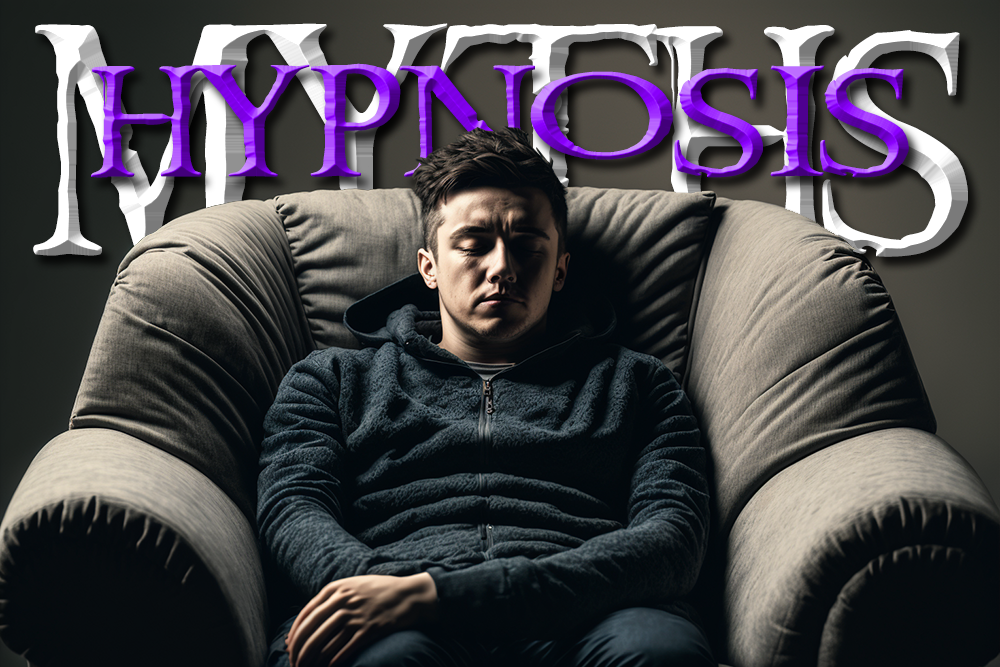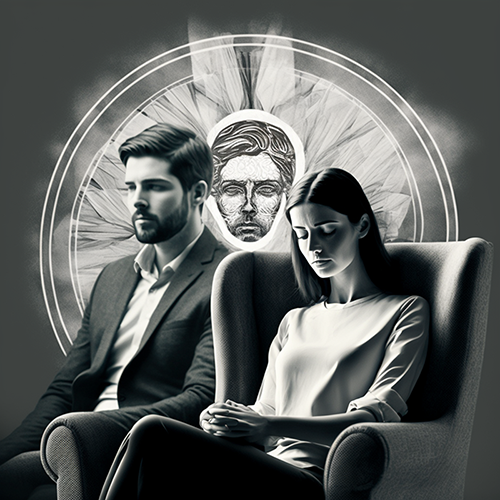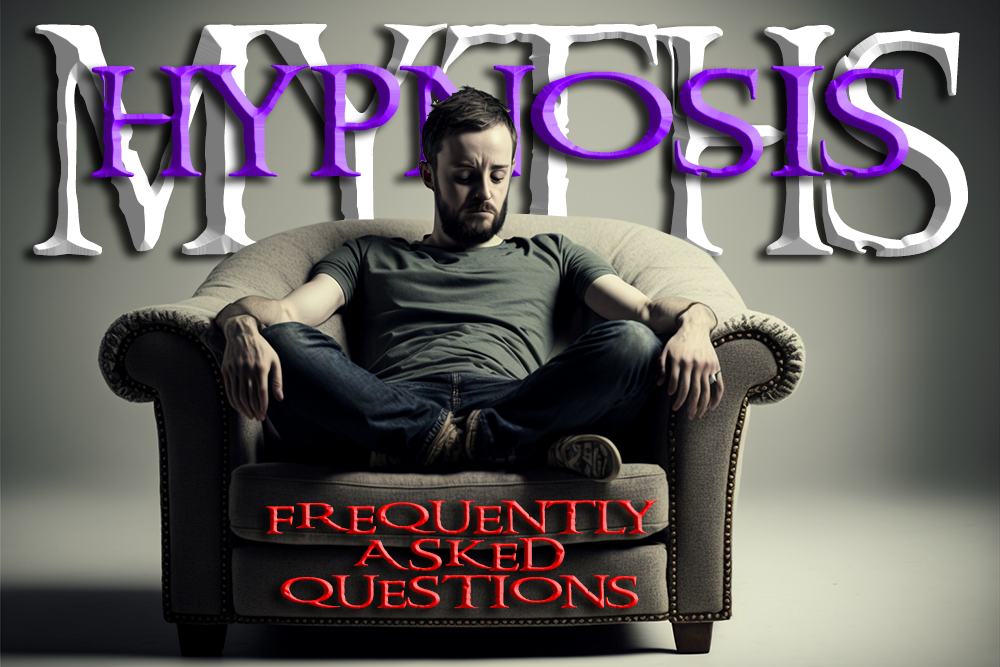
Debunking 5 Common Myths
Hypnosis is a popular topic in that so many folks are interested in discussing it and so many folks have heard myths here and there that make them think they know more than they do . . . so, it is time to dispel some of the most commonly believed myths that just are not true.
So . . . here we go!

Introduction: Uncovering the Truth:
Debunking Common Myths about Hypnosis and Anxiety Treatment
Anxiety is a common mental health condition that affects millions of people worldwide. It can manifest in many different forms, from general worry and nervousness to specific phobias and panic disorders. While there are many treatment options available, such as therapy and medication, hypnosis is often overlooked as a viable solution.
Despite its effectiveness as a treatment, there are still many misconceptions surrounding hypnosis and its use in treating anxiety. Some people may view hypnosis as a form of entertainment, or may believe that it can make someone do something against their will. Others may think that only certain people can be hypnotized, or that hypnosis is not scientifically proven.
In this blog post, we will be debunking some of the most common myths about hypnosis and anxiety treatment, to help clear up any confusion and misconceptions. We hope that by the end of this post, you will have a better understanding of how hypnosis can be used to effectively treat anxiety and improve mental health.

Dispelling Myths About Hypnosis
While hypnosis has been around for quite a long time and quite a few folks have direct experience with it, quite a few folks have only connected to hypnosis through fiction, hearsay, and myths. So, now is as good a time as ever to set the record straight and correct some of the more common misunderstandings about hypnosis.
Myth 1: “Entertainment or Therapy?
Separating Fact from Fiction on Hypnosis

This is one of the most common misconceptions about hypnosis. Many people believe that hypnosis is only used for entertainment purposes, such as stage shows where people are made to do funny or embarrassing things. However, hypnosis is actually a powerful therapeutic tool that has been used for decades to help people overcome a variety of issues, including anxiety.
Hypnosis works by inducing a state of deep relaxation and heightened suggestibility in the individual. While in this state, a hypnotherapist can make positive suggestions to the person’s subconscious mind that can help change their thoughts and behaviors. This can be used to help people overcome anxiety by changing the way they think and feel about their fears and worries.
It’s important to note that hypnosis is not a form of magic or mind control, it’s a therapeutic tool that can be used to help individuals overcome issues and improve their mental health. Hypnosis can be used in a variety of settings and with a variety of issues, not just for entertainment purposes.
Myth 2: Trance or Relaxation?
Understanding the Reality of Hypnosis

Another common misconception about hypnosis is that it puts the person in a trance-like state, where they are unconscious or have no control over their actions. This couldn’t be further from the truth. During hypnosis, the person is actually in a state of deep relaxation and heightened suggestibility, but they are fully aware of their surroundings and can choose to follow or ignore the suggestions given by the hypnotherapist.
During hypnosis, the person’s mind is in a heightened state of focus and concentration, which allows them to be more receptive to positive suggestions. The person is in a state of heightened awareness, and can choose to come out of the hypnotic state at any time if they so choose.
It’s also important to note that hypnosis is not sleep, it’s a state of focused attention and heightened suggestibility. The person is fully aware of what’s happening and can choose to accept or reject the suggestions given. Also, there is no such thing as a trance state that can make people do things they do not want to do or remember things they do not want to remember.
Myth 3: Mind Control or Self-Control?
Debunking the Myth of Hypnosis Making
People do Something Against their Will

This is another common misconception about hypnosis. Some people believe that hypnosis can be used to control someone’s actions or make them do something against their will. However, this is not true. A person under hypnosis is fully aware of their surroundings and can choose to follow or ignore the suggestions given by the hypnotherapist. Hypnosis is not a form of mind control, and a person cannot be made to do something they do not want to do.
A hypnotherapist will work with the person to set goals and make positive suggestions that align with their values and beliefs. The person is in control of their actions at all times, and can choose to accept or reject the suggestions given. Hypnosis is a collaborative process, where the therapist and the person work together to achieve the desired outcome.
It’s important to note that hypnosis is a powerful tool to help people overcome issues, but it is not a magic wand that can make someone do something against their will. The person is always in control and can choose to accept or reject the suggestions given. Additionally, hypnosis is not suitable for treating individuals with severe mental health disorders or those who are not capable of giving informed consent.
Myth 4: Elite or Average?
Dispelling the Myth of Who Can be Hypnotized

This is another common misconception about hypnosis. Some people believe that only certain people can be hypnotized, such as those who are easily suggestible or have a weak will. However, this is not true. Anyone can be hypnotized, as long as they are willing to participate in the process.
There is a common belief that people who are highly suggestible or have a weak will are more likely to be hypnotized. However, research has shown that suggestibility has little to do with whether a person can be hypnotized or not. In fact, people who are skeptical or have strong willpower can also be hypnotized, as long as they are willing to participate in the process.
It’s important to note that hypnosis is a collaborative process, and the person needs to be willing to participate in order for it to be effective. The more willing the person is to engage in the process, the more likely they are to experience positive results. Additionally, some people may be more resistant to hypnosis, that doesn’t mean they can’t be hypnotized. It just means that they may require more time and effort to achieve the desired result.
Myth 5: Science Fiction or Science Fact?
Examining the Evidence on Hypnosis

This is another common misconception about hypnosis. Some people believe that hypnosis is not scientifically proven and that it is not a valid form of treatment. However, this is not true. Hypnosis has been extensively researched and studied, and there is a growing body of scientific evidence that supports its effectiveness as a treatment for various conditions, including anxiety.
Studies have shown that hypnosis can be an effective treatment for anxiety, as it helps to reduce symptoms such as nervousness, worry, and fear. Research has also shown that hypnosis can be used to help people overcome phobias, such as fear of heights, spiders, and other specific objects or situations.
It’s also important to note that hypnosis is recognized as a valid form of treatment by major medical and psychological organizations, such as the American Psychological Association and the American Medical Association. These organizations recognize the effectiveness of hypnosis as a treatment for various conditions, including anxiety.
Additionally, hypnosis is widely used in clinical settings, such as hospitals and clinics, to help people with a variety of health issues. Many medical professionals, such as doctors, dentists, and nurses, use hypnosis as a complementary treatment to help patients manage pain, anxiety, and other symptoms.

Putting Myths to Rest:
The Realities and Benefits of Hypnosis for Anxiety Treatment
In conclusion, hypnosis is a valuable tool for treating anxiety and other conditions. It is a safe, non-invasive, and effective form of treatment that has been extensively researched and studied. The misconceptions and myths surrounding hypnosis have led to a misunderstanding of its true nature and capabilities.
It’s important to note that hypnosis is not a magic wand that can make someone do something against their will, only certain people can be hypnotized, or that it’s not scientifically proven. Hypnosis is a collaborative process, and the person needs to be willing to participate in order for it to be effective.
Additionally, while hypnosis is not suitable for treating individuals with severe mental health disorders or those who are not capable of giving informed consent, it can be a powerful tool for those who are willing to participate. With the guidance of a trained hypnotherapist, hypnosis can help people overcome anxiety, phobias, and other conditions.
In summary, hypnosis is a valuable tool for treating anxiety and other conditions, and it’s important to understand the truth about hypnosis rather than being misled by myths and misconceptions. If you’re suffering from anxiety and looking for a treatment option, it’s worth considering hypnotherapy as a possible solution.

Frequently Asked Questions
Q: What is hypnosis and how is it used to treat anxiety?
A: Hypnosis is a state of deep relaxation and concentration that allows a person to access their subconscious mind. It is used to help people overcome anxiety by allowing them to address the underlying causes of their anxiety and make positive changes to their thought patterns and behaviors.
Q: Is hypnosis safe?
A: Yes, hypnosis is considered to be a safe and effective treatment for anxiety when performed by a trained and qualified professional.
Q: Can anyone be hypnotized?
A: Yes, anyone can be hypnotized as long as they are willing to participate and are able to follow instructions.
Q: Can hypnosis make a person do something against their will?
A: No, hypnosis cannot make a person do something against their will. A person in hypnosis is always in control and can choose to accept or reject suggestions made by the hypnotist.
Q: How long does it take to see results from hypnosis treatment for anxiety?
A: The length of time it takes to see results from hypnosis treatment for anxiety can vary depending on the individual and the severity of their anxiety. Some people may see results after just one session, while others may require multiple sessions.
Q: Is hypnosis covered by insurance?
A: This can depend on the insurance company and the individual’s specific coverage. It’s best to check with your insurance company to see if hypnosis is covered.
Q: Are there any side effects of hypnosis?
A: There are no known negative side effects of hypnosis when performed by a trained and qualified professional. However, some people may experience mild disorientation or dizziness immediately after a hypnosis session.
Q: Can you use hypnosis for other problems?
A: Hypnosis can be used to treat a wide range of issues, such as insomnia, phobias, pain management, weight loss, sexual issues, and so very much more.
If you would like to learn more about using hypnosis techniques, consult our Core Skills program and other products found in our online store at https://briandavidphillips.net/store (you may wish to check out our package programs for even more value).
Our ErosPsyMagick+ program at https://briandavidphillips.net/erospsymagickplus is of particular interest as it has everything rolled into one comprehensive package . . . core skills, metaphysical magickal psychic, and eroticatrance ecstatic states.
If you’re in Taiwan and interested in hypnosis, check the services page linked to in the top left sidebar. Not in Taipei? Check the store for recordings in the same menu area as well as links to lots and lots of info and goodies. Of course, browsing this site will bring you to a digital ton of positive resources on a wide variety of topics as well.
Live Trance and Prosper,
Brian David Phillips
Trance Wizard
www.BrianDavidPhillips.net










